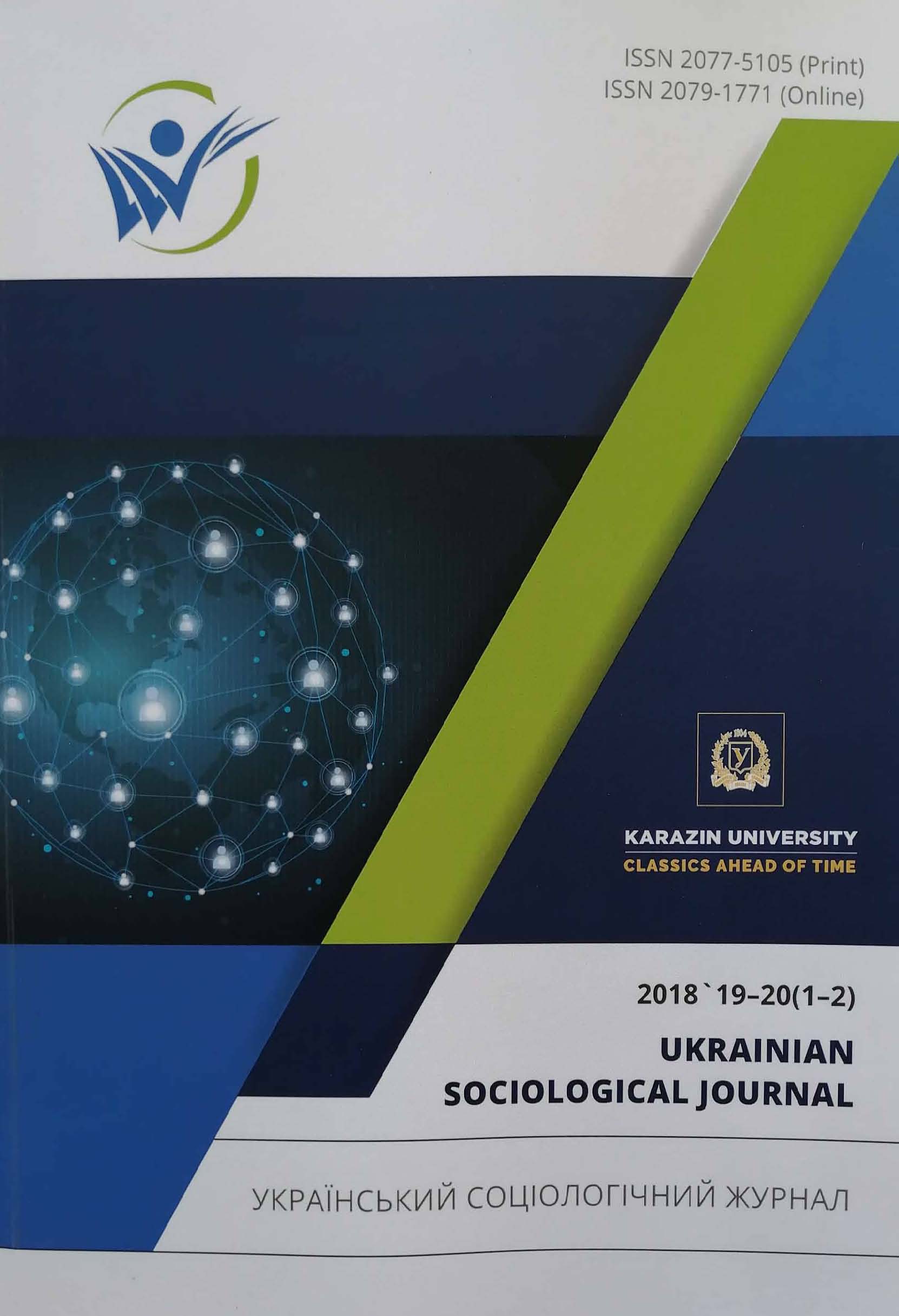Культурні контексти відходу від правди: приклади польські і не тільки
Анотація
Стаття присвячена аналізу причин появи постправди, що актуалізувалися не лише в сучасності, але й у досить віддаленому минулому. Наведено низку понять, що за своїм змістом є близькими до поняття «постправда». Підкреслемо, що існування пост правди значною мірою зумовлено занепадом елітарних, етосних прошарків, що творили вищу культуру й культивували честь і правдомовність, а також секуляризацією суспільного життя, що відокремила правду від сфери сакруму. Особлива увага приділена викладанню російського розуміння правди та істини, заснованого на філософській традиції, зануреного у православ’я. Зазначимо, що поза правовий моральний суб’єктивізм, характерний для розуміння правди в СРСР і притаманний комуністичній моральності більшовиків, призводив до масових злочинів у період сталінського правління. Доведено, що в Польщі елітарний етос, який існував ще в період між двома світовими війнами, суттєво занепав після Другої Світової війни і поступово «розмився» після 1989 року. У цей період такі чинники цього етосу, як католицизм, історична ідентичність, література,були ослаблені, а разом з ними національна ідентичність в цілому,що знизило вагу елементів, базованих на гідності, в суспільному житті, а отже, і правди як одного з них. Акцентовано увагу на тому, що в умовах сучасного світу, внаслідок низки нових політичних, економічних і культурних явищ правда набула виразно релятивістського виміру, а нова дійсність знайшла ідейне вираження в концепції постмодерності. Сформульовано висновки про те, що сьогодні у людей з’являється відчуття, ніби вони живуть у світі хаосу: інформаційного, ціннісного і культурного. Наслідком цього є значне ослаблення категорій раціонального мислення, культури дискусії, інтелектуального виміру вищої культури, політично-культурна фрагментаризація суспільства. Зниження рівня суб’єктності індивідів і соціальних зв’язків та формування плинних ідентичностей поглиблюють наявну кризу, котра знаходить своє вираження, в тому числі, у явищі постправди.
Завантаження
Посилання
Faryno J. Правда/Истина. Mentalność rosyjska. Słownik / red. A. Lazari. Katowice: IBIDEM, 1995. S. 64.
Bierdiajew M. Zarys metafi zyki eschatologicznej / tłum. z ros. W. i R. . Paradowscy. Kęty: Antyk, 2004. 174 s.
Kurkiewicz A. Fenomen rosyjskiego ujęcia prawdy. Sprawy Wschodnie (Poznań). 2005. №2-3 (9-10). S. 33-44.
Špidlík T. Myśl rosyjska. Inna wizja człowieka. / tłum. z czes. J. Dembska. Warszawa: Promic, 2000. 532 s.
AKu. Putin mówi, że na Krymie nie ma rosyjskich żołnierzy?! A ten to co? Zobacz WIDEO. URL: http://www.se.pl/wiadomosci/ swiat/putin-mowi-ze-na-krymie-nie-ma-rosyjskich-zolnierzy-ten-to-cozobacz-wideo_384454.html – 10.04.2017 р.
Dura M. Putin: Krymu nie zajęli Rosjanie. Majdan szkolił się w Polsce i na Litwie. 2017. URL: http://www.defence24.pl/63446,putinkrymu-nie-zajeli-rosjanie-majdan-szkolil-sie-w-polsce-i-na-litwie (дата звернення 10.04.2017 р.
Jasinowski B. Wschodnie chrześcijaństwo a Rosja. Wilno: Instytut Naukowo-Badawczy Europy Wschodniej, 1933. VI+173 s.
Chałasiński J. Kultura i naród. Studia i szkice. Warszawa: Książka i Wiedza, 1968. 616 s.
Radzik R. Społeczny wymiar rosyjskiego prawosławia. Rosyjski imperializm wspólnotowy. Trójjedyny naród ruski w badaniach socjologicznych. Lublin: Wydawnictwo Uniwersytetu Marii CurieSkłodowskiej, 2016. S. 87-114.
Радзік Р. Вакол ідэнтычнасці беларусаў / пер. з польск. мовы С. Петрыкевіч, навук. рэд. Г. Сагановіч (Бібліатэка часопіса «Беларускі Гістарычны Агляд»). Мінск: Лімарус, 2017. 309 s.
Meyendorff J. Teologia bizantyjska. Historia i doktryna. / tłum. z ang. J. Prokopiuk. Warszawa: Instytut Wydawniczy PAX, 1984. 312 s.
Łosski W. Teologia mistyczna Kościoła Wschodniego / tłum. z fr. M. Szaniecka. Warszawa: Instytut Wydawniczy PAX, 1989. 228 s.
Co to jest astroturfi ng? Spiskowa teoria dotycząca protestów. 2017. URL: http://www.se.pl/wiadomosci/polityka/co-jest-astroturfi ngspiskowa-teoria-dotyczaca-protestow_1010027.html (дата звернення 27.07.2017)
Radzik R. Czy jest w Polsce inteligencja? Przegląd Powszechny (Warszawa). 1994. №5. S. 161–176.
Minister Ewa Kopacz i zmienione stenogramy 2010. URL: https://www.youtube.com/watch?v=xpYjVEyhyjA – 1.04.2017 р.
Sejm Rzeczypospolitej Polskiej. Kadencja VI. Sprawozdanie Stenografi czne z 65 posiedzenia Sejmu Rzeczypospolitej Polskiej w dniu 29 kwietnia 2010 r. (drugi dzień obrad). 2010. URL: http://orka2. sejm.gov.pl/StenoInter6.nsf/0/D43880E41EBF5310C125771500009F FD/$fi le/65_b_ksiazka.pdf
Post-prawda szefa Straży Marszałkowskiej? «Nie było polecenia blokowania dostępu opozycji do Sali Kolumnowej». Gazeta Wyborcza 21.12.2016. URL: http://wiadomosci.gazeta.pl/wiadomosc i/7,114883,21156487,post-prawda-szefa-strazy-marszalkowskiej-niebylo-polecenia.html (дата звернення 15.04.2017)
Klemperer V. LTI: Notatnik fi lologa / tłum. J. Zychowicz. Kraków–Wrocław: Wydawnictwo Literackie, 1983. 327 s.
Kleiber M. Sceptycyzm jest dziś w cenie. Rzeczpospolita (Warszawa). 2017. 15 квіт. С. A11.
Bartkiewicz A. Post albo prawda. Rzeczpospolita. Plus Minus. 2017. 11 черв. С. 10.
Herman M. Internet zaczyna zjadać własny ogon. Gazeta Polska Codziennie. 2017. 6 квіт. URL: http://gpcodziennie. pl/62700-internetzaczynazjadacwlasnyogon.html (дата звернення 15.04.2017).
Szreder M. Umysł w epoce postprawdy. Tygodnik Powszechny: Kraków. 2017. 9 квіт. С. 58-59.
Kisielewski S. Terroryzm ideowy. Bunt Młodych: Warszawa. 1936. 25 лют. URL: http://retropress.pl/bunt-mlodych/terroryzmideowy/ (дата звернення 15.05.2017).
Piłka M. PiS z Balcerowiczem. Rzeczpospolita: Warszawa. 2017. 1 серп. C. A10.




